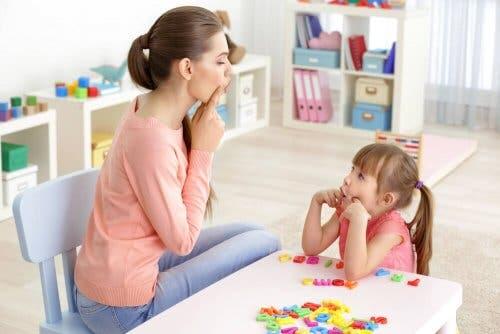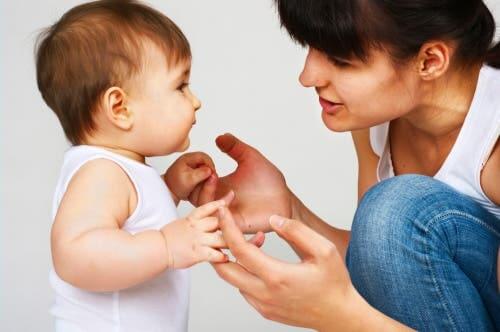The Benefits of Raising Bilingual Children

In an increasingly global society, it’s common to see children grow up in a multicultural environment where they speak several languages at home. This has opened up the debate as to whether it is healthy to raise bilingual children. While some think it’s a good thing, others think that it may confuse kids.
The questions that researchers and educators ask themselves are the same ones that arise for the parents of these bilingual children. Is it confusing for children to speak two languages? Are bilingual children smarter? Is it good to speak to them in two languages from their first words or is it better to wait?
These questions have very clear answers. Keep reading to learn more!
Is it healthy to raise children in bilingual environments?
People who think that speaking in two languages to children is counterproductive argue that the mixture of languages will make it more difficult for them to socialize and learn. After all, they may confuse languages when trying to express themselves and will have difficulties differentiating between the languages.
However, experience and studies show just the opposite. “Children exposed to more than one language have a higher tissue density in the areas of the brain corresponding to learning, language, memory, and attention,” says pediatrician Gwendolyn Delaney, summarizing many studies.
Censuses project that large cities will have 50% of bilingual children in kindergarten by 2035. However, studies on the effects of this trend are scarce, although they all indicate that it has many positive aspects.
Does being bilingual confuse children?

Adults who speak multiple languages often have no problem differentiating when to use one or the other. Some think that for a child who is just learning to speak it can be more confusing.
The American Linguistic Society assures us that children quickly learn to understand the differences between one language and another. They might make minor mistakes in sentence construction or pronunciation, but they correct these without difficulty.
There may also be a mixture of codes, as defined by linguist Barbara Pearson in her book Raising a Bilingual Child when referring to using words from one language interspersed in another. However, the author considers it to be normal learning behavior and not a symptom of confusion or dyslexia.
Psychologist Laura Namy explains that using a word from one language as part of their conversation in another language doesn’t mean that they don’t know which word belongs to one language or another. Studies show that as early as two years old, boys and girls can choose which language to use according to the speaker.
Are bilingual children smarter?
It’s clear that speaking more than one language offers professional and cultural advantages. However, in addition, some studies indicate that it can also offer advantages in social behavior.
A study at York University in Toronto, Canada suggests that bilingual children respond better to different changes in topics and subjects in schools. Other studies also open up the possibility that learning multiple languages can help improve memory during childhood.
Psychologist Glenn Schellenberg believes that communication skills such as languages and music give an advantage in the breadth of knowledge. This doesn’t mean that bilinguals are necessarily more intelligent, but that they have more tools for their cognitive development.
You might be interested in: Teach Children Happiness, not Perfectionism
Should you prioritize a language when talking to bilingual children?

In classical education, they recommended you use only one language in daily communication with children and leave the secondary language for school instruction. Those concepts have changed.
Linguist Annick De Houwer believes that children who constantly hear two languages learn them without difficulty. They can even understand the differences when they speak two different languages with the same person.
The American Linguistic Society explains that nobody teaches infants to speak. They learn out of a need for communication and will choose a primary language on their own.
For example, a child from an English family living in Spain may use English as their primary language in their first years of life. However, when they start going to school, socializing, and taking classes in Spanish, their primary language will be Spanish.
Should parents avoid mixing languages?
Many parents of bilingual children are also bilingual and speak two languages interchangeably in normal conversation. They may even code switch unconsciously even while they’re speaking one language.
There aren’t many studies on how this affects children and the results are mixed. However, the latest research indicates that children adapt to and understand the mix of codes, which quickly disappear when they go to school.
At what age is it best to expose children to multiple languages?

There’s no ideal age to learn a second language. The idea that those who learn a second language later don’t learn it well isn’t shared by most educators. What the studies do prove is that it’s easier to learn in the first years of life. The sooner, the better!
David Birdsong, director of the Department of Languages at the University of Austin, Texas, explains that there’s no shift in the development of language learning that makes it worse, but there is a decline in learning skills over the years.
As we become accustomed to language-specific vocalization and listening, the assimilation of particular sounds from a different language becomes more difficult. Therefore, learning two languages at an early age makes it easier to adapt to the differences in languages.
Conclusions and benefits
- Infants can learn more than one language from a very early age.
- Learning two languages doesn’t cause confusion.
- Bilingual children can easily differentiate between the two languages.
- Learning more than one language facilitates social behavior.
- People who speak more than one language have a broader range of cognitive tools.
- Speaking more than one language also provides better learning tools.
- Bilingual people have more possibilities for their professional life.
All cited sources were thoroughly reviewed by our team to ensure their quality, reliability, currency, and validity. The bibliography of this article was considered reliable and of academic or scientific accuracy.
- Bilingualism: consequences for mind and brain. Bialystok E1, Craik FI, Luk G. Department of Psychology, York University, Toronto, Canada.
- Influence of bilingualism on memory generalization during infancy. Brito N, Barr R. Developmental Science. 2012;15(6):812–816. doi: 10.1111/j.1467-7687.2012.1184.x.
- Bilingualism: consequences for mind and brain. Trends in Cognitive Sciences. Bialystok E, Craik FIM, Luk G. 2012;16(4):240–250. doi: 10.1016/j.tics.2012.03.001.
- Parental language input patterns and children’s bilingual use. Applied Psycholinguistics. De Houwer A. 2007;28(03):411–424. doi: 10.1017/S0142716407070221.
- FAQ: Raising Bilingual Children. Linguistic Society of America.https://www.linguisticsociety.org/resource/faq-raising-bilingual-children
This text is provided for informational purposes only and does not replace consultation with a professional. If in doubt, consult your specialist.








